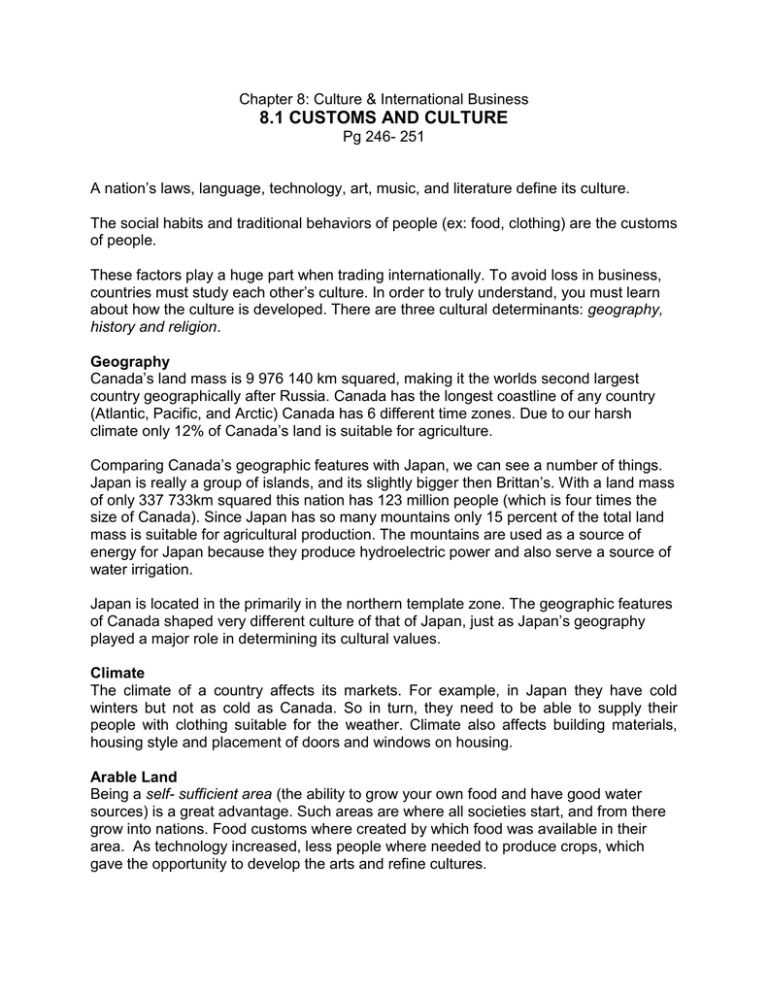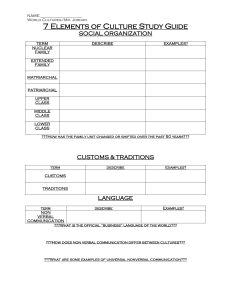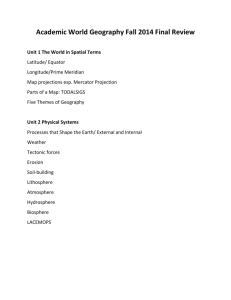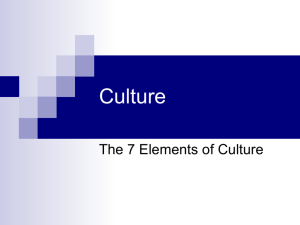8.1 CUSTOMS AND CULTURE
advertisement

Chapter 8: Culture & International Business 8.1 CUSTOMS AND CULTURE Pg 246- 251 A nation’s laws, language, technology, art, music, and literature define its culture. The social habits and traditional behaviors of people (ex: food, clothing) are the customs of people. These factors play a huge part when trading internationally. To avoid loss in business, countries must study each other’s culture. In order to truly understand, you must learn about how the culture is developed. There are three cultural determinants: geography, history and religion. Geography Canada’s land mass is 9 976 140 km squared, making it the worlds second largest country geographically after Russia. Canada has the longest coastline of any country (Atlantic, Pacific, and Arctic) Canada has 6 different time zones. Due to our harsh climate only 12% of Canada’s land is suitable for agriculture. Comparing Canada’s geographic features with Japan, we can see a number of things. Japan is really a group of islands, and its slightly bigger then Brittan’s. With a land mass of only 337 733km squared this nation has 123 million people (which is four times the size of Canada). Since Japan has so many mountains only 15 percent of the total land mass is suitable for agricultural production. The mountains are used as a source of energy for Japan because they produce hydroelectric power and also serve a source of water irrigation. Japan is located in the primarily in the northern template zone. The geographic features of Canada shaped very different culture of that of Japan, just as Japan’s geography played a major role in determining its cultural values. Climate The climate of a country affects its markets. For example, in Japan they have cold winters but not as cold as Canada. So in turn, they need to be able to supply their people with clothing suitable for the weather. Climate also affects building materials, housing style and placement of doors and windows on housing. Arable Land Being a self- sufficient area (the ability to grow your own food and have good water sources) is a great advantage. Such areas are where all societies start, and from there grow into nations. Food customs where created by which food was available in their area. As technology increased, less people where needed to produce crops, which gave the opportunity to develop the arts and refine cultures. Transportation Methods of transportation are adapted to suit the land structure. (i.e.: dogsled to snowmobile) Canadian Aboriginals showed explorers how to make canoes, which brought trade and settlement. Canada’s cultural identity was solidified when the railroad was built. Location European explorers were impressed with Canada’s land because its many natural resources made it a desirable place to bring settlement and trade. Explorers come from all over the world to build off our resources, this created our Canadian Mosaic. Natural Hazards Culture is structured around the hazards that may occur. This includes many aspects including buildings and mythology. Canada does not have to worry about natural hazards because it is rare for us to get hurricanes, earthquakes, etc. We do get spring flooding, tornadoes, and some winter storms, but they cause nowhere near the amount of damage that other countries experience. History The study of a country’s history is also a study of its culture, in the same way that history is about the settlement of nations and the cultural values that new inhabitants bring to their new homeland. A country’s history also deals with challenges and advantages posed by its surroundings. Settlers choose to inhabit a place because it provides them with things they value, such as space, freedom, or resources. People move into another country either by invitation or permission as residents, immigrants, or refugees, or by colonization or conflict as conquerors. Aboriginal peoples were the first to live in Canada. Next came the Vikings, English, and French. As settlement continued, immigrants came from Germany, Poland, Italy, Greece, Africa, the West Indies, the United States, Asia, and many other places. Each of these cultures, itself shaped by many other cultures, contributed to now what is a multicultural society. All of Canada’s customs have been an influence of different cultures. Religion Religion usually plays an enormous role in determining the cultural values of a nation. Some societies have a single religion that shapes their laws and customs. Other societies embrace a multitude of religious beliefs, often in conflict with each other. Religious ceremonies and celebrations are often accompanied by holidays.





